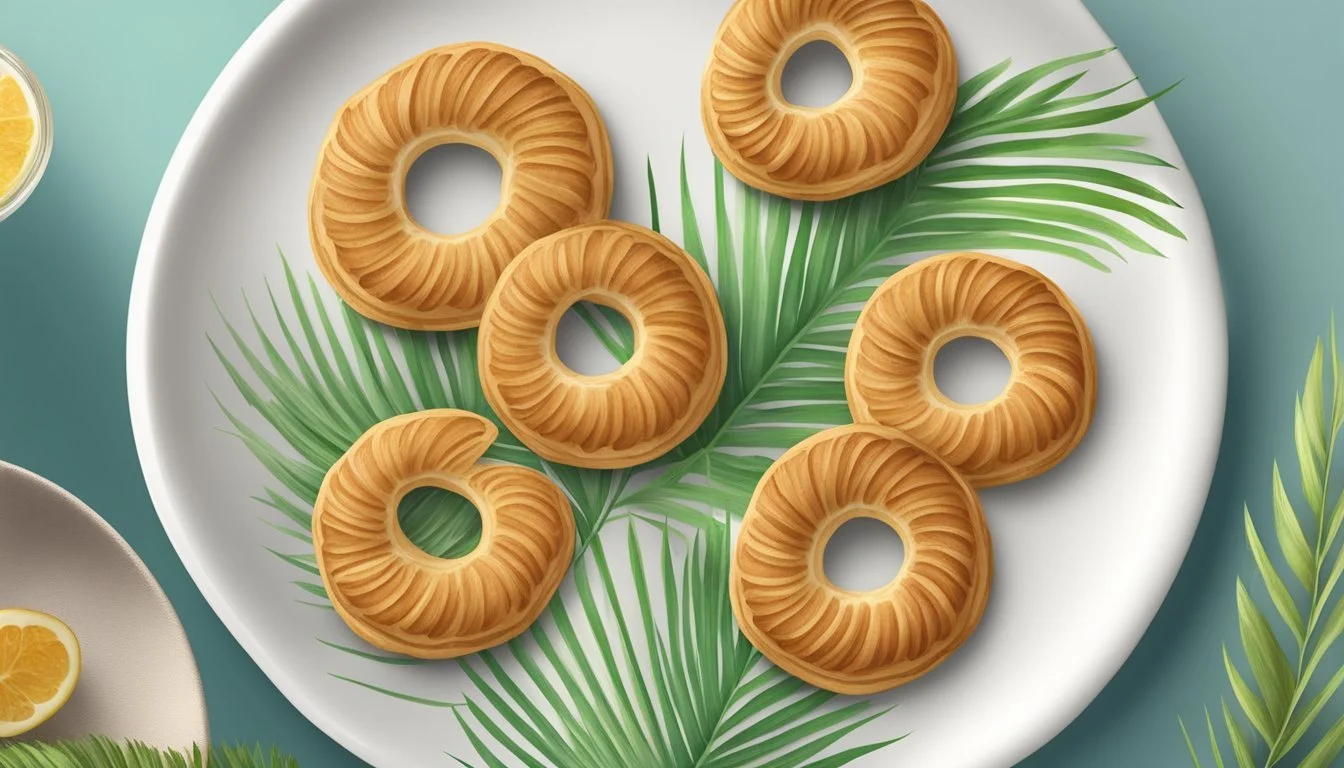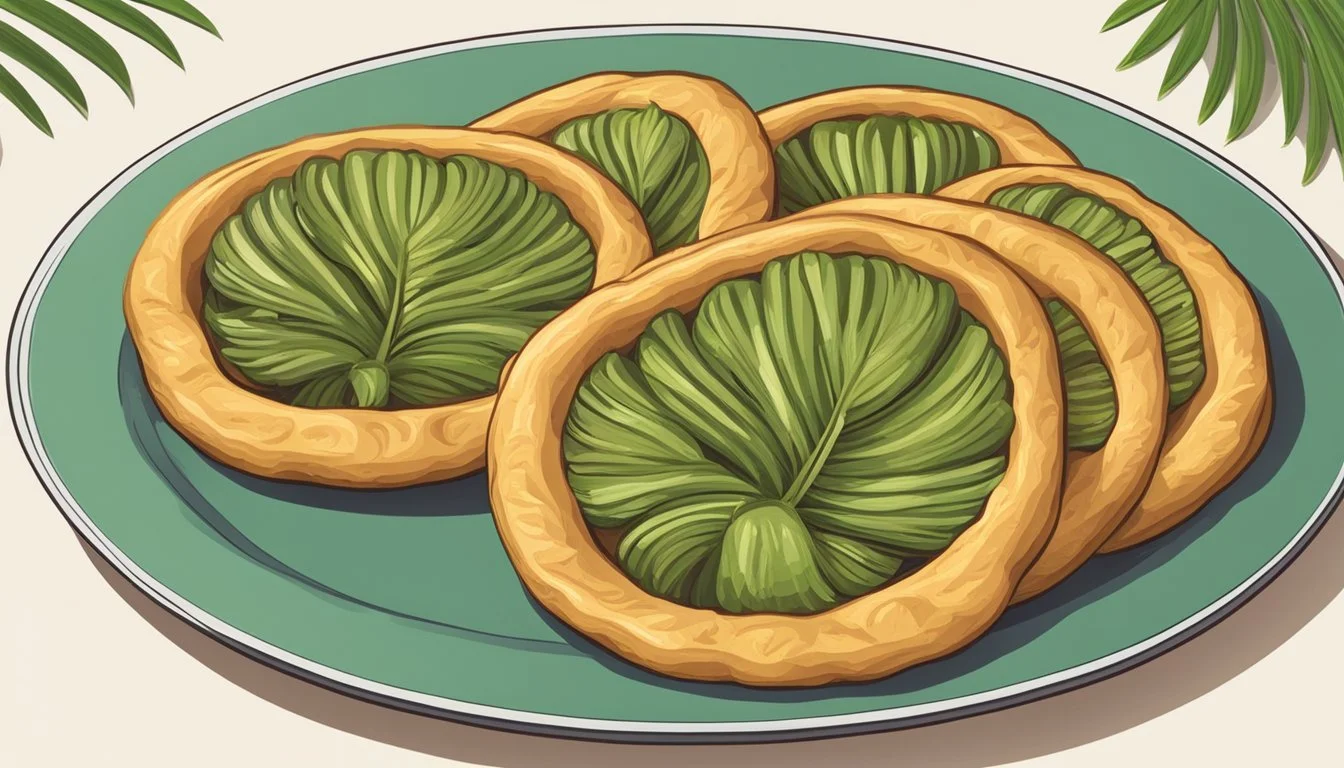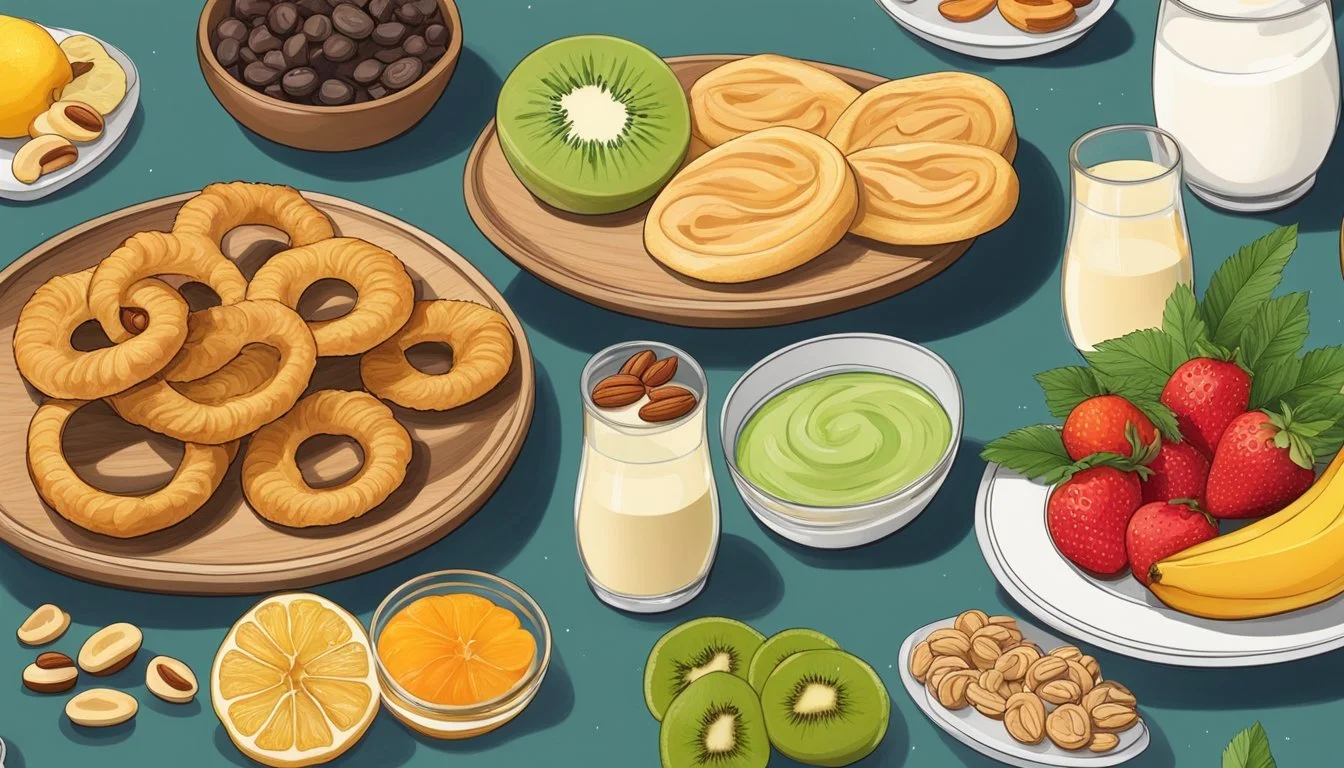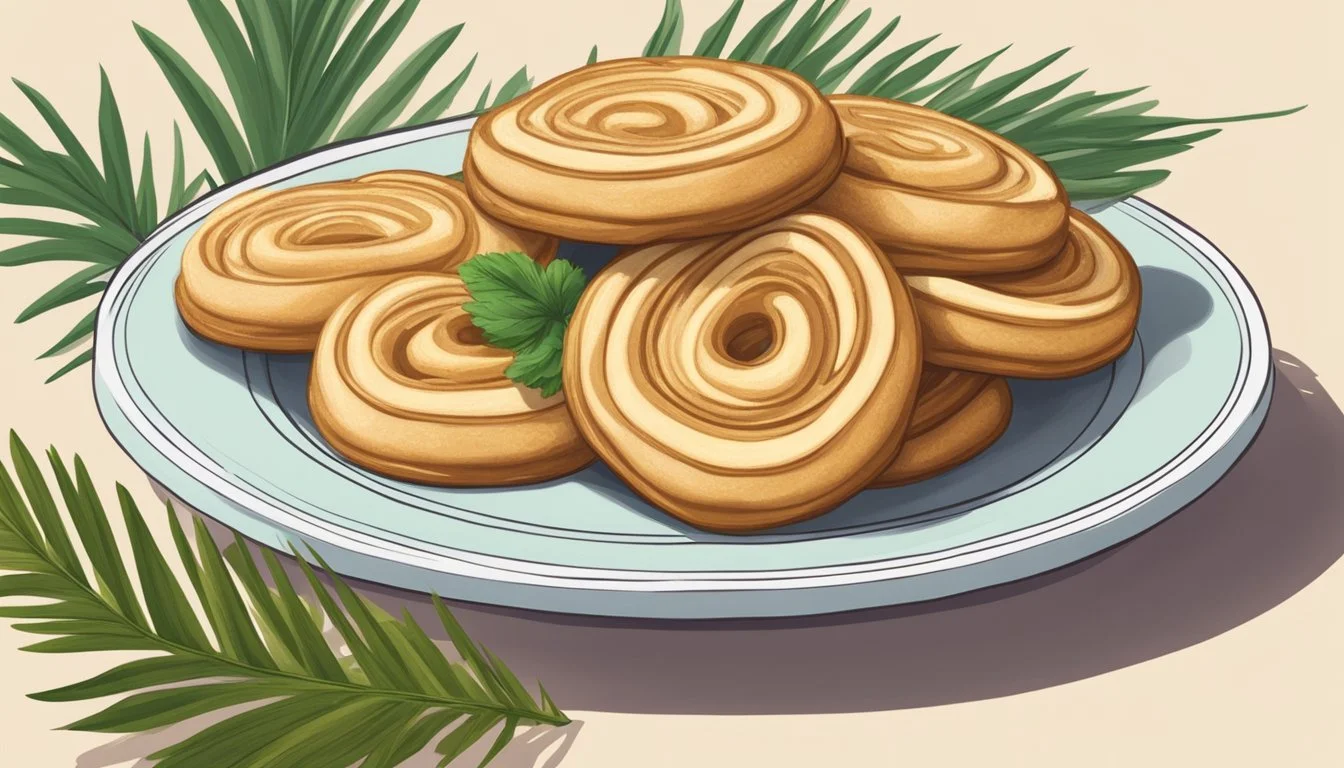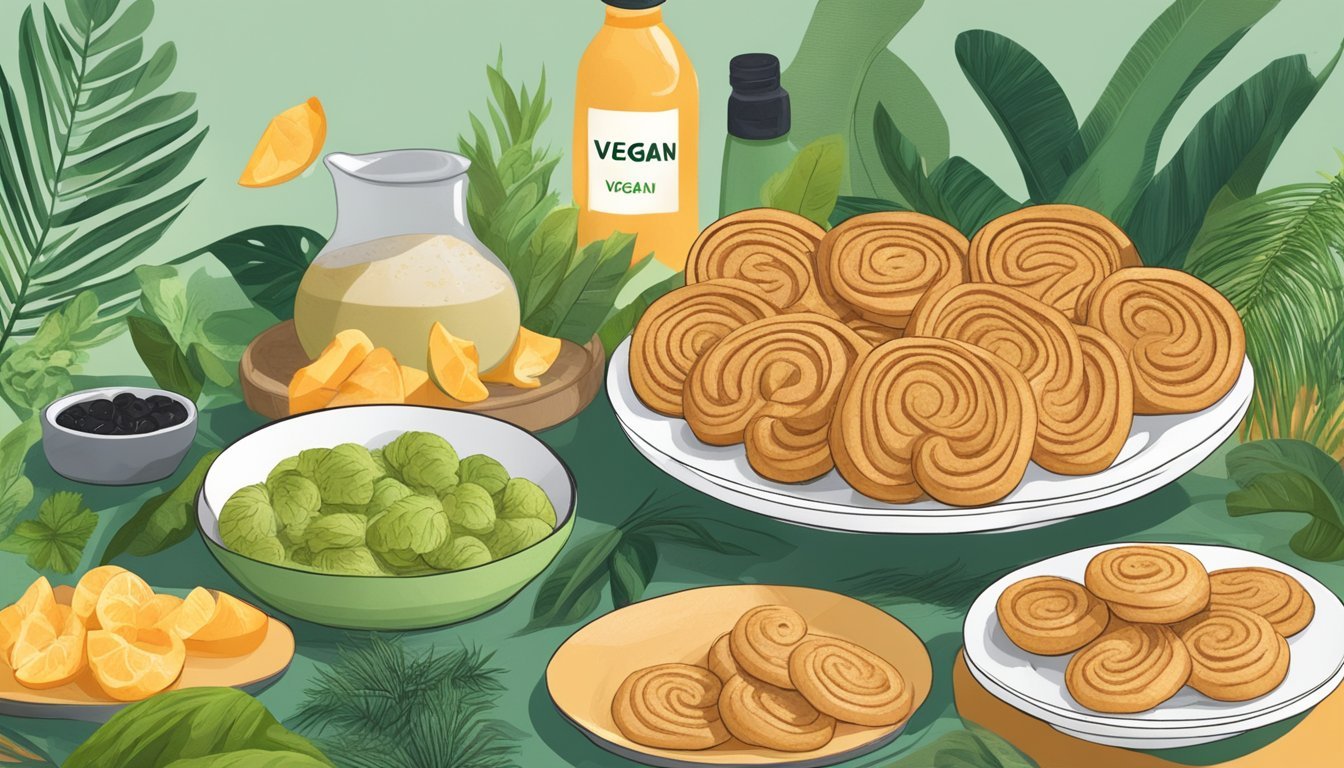Are Palmiers Vegan?
Unveiling the Truth About This Classic Pastry
Palmiers, known for their distinctive heart or butterfly shape, have a rich history in French pastry traditions. Typically made with puff pastry and sugar, these flaky, sweet treats are also referred to as elephant ears or French hearts. The traditional recipe for palmiers requires a simple set of ingredients, usually just puff pastry and sugar, which, when caramelized during baking, gives them their characteristic crispy, layered texture and sweet, toasted flavor.
When considering if palmiers can be vegan, one must evaluate the ingredients used in puff pastry, which is the primary component of palmiers. Puff pastry is a light, flaky dough that rises when baked due to the layers of fat, traditionally butter, creating steam during the cooking process. In classic French baking, butter is an essential ingredient, but its use precludes palmiers from being vegan. However, with the growing demand for plant-based alternatives, many brands now offer vegan puff pastry made with vegetable fats or oils instead of butter, making it suitable for those following a vegan lifestyle.
As veganism becomes more prevalent, there are increasing numbers of recipes and store-bought options for vegan palmiers. These alternatives make it possible to enjoy palmiers while adhering to a vegan diet, by substituting animal ingredients with plant-based ones. Vegan palmiers retain the delightful crunch and sweetness without compromising on taste or texture, proving that this French confection can indeed be both indulgent and vegan-friendly.
What Are Palmiers?
Palmiers, also known as "elephant ears" in English-speaking countries, are a classic French pastry. Their distinctive shape and flaky texture have made them a beloved treat in various culinary traditions.
Historical Background
Palmiers are believed to have originated in France, where they are an integral part of the country's rich pastry heritage. Their name, which translates to "palm tree" in French, reflects their characteristic leaf-like shape. However, this pastry has transcended its French roots and has been adopted with regional variations in Spanish and Mexican bakeries, among others.
Understanding the Basic Ingredients
The basic ingredients of palmiers are puff pastry and sugar. Puff pastry is made from alternating layers of dough and butter, rolled and folded multiple times to create its signature flaky texture. The palmier is crafted by:
Coating a sheet of puff pastry in a layer of sugar
Folding the pastry and then cutting it into slices that, when baked, puff up and caramelize.
As such, the traditional palmier recipe is simple, focusing on the quality of the puff pastry and the caramelization of sugar to achieve its iconic taste and texture.
Vegan Considerations
When preparing palmiers for a vegan diet, it is crucial to scrutinize ingredients that may traditionally be non-vegan and to utilize appropriate substitutions that maintain the integrity of the dish while adhering to vegan standards.
Identifying Non-Vegan Ingredients
Butter: Traditionally, palmiers are made with butter-laden puff pastry. Since butter is derived from dairy, it is not vegan.
Puff Pastry: While some store-bought puff pastry is accidentally vegan, one must be vigilant, as many brands include butter.
Other Fillings: Basic palmiers might only need sugar, but variations with fillings like chocolate or pesto may contain non-vegan ingredients.
Vegan Substitutes for Traditional Ingredients
Vegan Puff Pastry:
Look for brands that use plant-based fats or make your own with vegan butter.
Dairy-Free Brands: Many commercial puff pastries are naturally vegan, check labels for dairy-free certifications.
Homemade: Combine flour and salt, cutting in vegan butter, then fold and roll repeatedly for layers.
Vegan Butter:
Choose a butter substitute made from plant oils that mimics the texture and flavor of traditional butter.
Brands: Earth Balance, Miyoko’s Creamery
Homemade: Blend oils such as coconut oil with a milk substitute and an emulsifier.
It is essential for a consumer committed to a vegan lifestyle to carefully read ingredient lists and verify that all components of their palmiers are plant-based.
Making Vegan Palmiers
Creating vegan palmiers requires choosing the right puff pastry, following a precise recipe, and mastering the baking technique to achieve that characteristic caramelized sweetness and flaky texture.
Choosing the Right Vegan Puff Pastry
When preparing vegan palmiers, it's critical to start with a vegan puff pastry, as traditional recipes often include butter. Confirm that the puff pastry is free from dairy and other animal-based ingredients. Many stores carry vegan puff pastry brands, but reading the label is a must. The ideal pastry should be cold but pliable for easy rolling and folding.
Step-by-Step Vegan Palmiers Recipe
Ingredients Gathering
Vegan puff pastry
Cinnamon sugar or coarse sugar (such as granulated or brown sugar mixed with ground cinnamon)
Flour for dusting
Preparation
Thaw the vegan puff pastry as per the package instructions.
Preheat the oven to 400°F (200°C) and line a baking sheet with parchment paper.
Assembly
Sprinkle a clean surface lightly with flour to prevent sticking.
Spread a layer of cinnamon sugar on the surface where you will roll out the puff pastry.
Unfold the puff pastry sheet onto the sugared surface and sprinkle the top with more cinnamon sugar.
Use a rolling pin to gently roll the pastry, pressing the sugar into the dough until it is about 1/4 inch thick.
Shaping
Fold the sides of the pastry to meet in the center, then fold them together again, forming a long, narrow, double-layer strip.
Chill the log briefly to ensure cleaner cuts and better shape retention during baking.
Cutting
Slice the log into 1/2 inch sections and place on the prepared baking sheet, leaving some space between each for expansion.
Baking
Bake in the preheated oven for 15-20 minutes, or until the sugar caramelizes and the pastry turns a golden brown.
Transfer the palmiers to a wire rack to cool. They should be consumed the same day for the best texture.
Baking Tips for Perfect Vegan Palmiers
Ensure the puff pastry remains cold before baking to guarantee a flaky outcome since a warmer dough may become greasy and heavy.
Sprinkling additional cinnamon sugar on the baking sheet before adding the palmiers will enhance the caramelization on the bottom.
Using a silicon mat or parchment paper helps prevent sticking and allows for an even bake.
Flip the palmiers halfway through the baking process for an even golden color on both sides.
Allow the palmiers to cool on a wire rack to avoid them becoming soggy from steam trapped underneath.
Storage and Preservation
Proper storage is crucial to maintain the flakiness and flavor of palmiers, whether they're homemade or store-bought. Here's how one can ensure their palmiers remain as fresh and delectable as possible.
Short-Term Storage Tips
For short-term storage, palmiers should be kept in an airtight container at room temperature. This method helps to maintain their crisp texture for up to a week. One must ensure the container is sealed properly to prevent moisture from softening the palmiers. It's also advisable to layer the palmiers with parchment paper to prevent sticking.
Room Temperature: Up to 1 week
Container: Airtight
Moisture: Avoid to prevent sogginess
Freezing and Reheating Instructions
To freeze vegan palmiers, one should first ensure they have cooled completely after baking. Then, place them in a single layer on a baking sheet to freeze initially. Once frozen, transfer the palmiers to a freezer-safe airtight container or a ziplock bag, separating layers with parchment paper.
Initial Freeze: Single layer on baking sheet
Freezer Storage: Airtight container or ziplock bag
Layer Separation: Parchment paper between layers
When it comes to reheating, there's no need to thaw; simply reheat them in the oven. Preheat the oven to 350°F (175°C) and warm the palmiers for about 5-7 minutes or until they are heated through and regain their crispness.
Oven Temperature: 350°F (175°C)
Reheating Time: 5-7 minutes
Thawing: Not required
One can freeze vegan palmiers for up to three months without losing their quality. Always label the storage container with the date to keep track of freshness.
Accompaniments and Variations
When exploring the variations of palmiers, one will find they can easily swing from sweet to savory, catering to a wide range of palates. Key ingredients like sugar and cinnamon or savory spreads such as pesto can transform this treat to fit any occasion, from a casual tea to an elegant party appetizer.
Savory and Sweet Options
Palmiers exhibit a versatile nature, allowing them to be crafted with either sweet or savory flavors. For a sweet variation, chocolate or jam might be incorporated to enhance their dessert-like quality. Cinnamon palmiers, coated generously with a mixture of sugar and cinnamon, are a classic choice that pairs exceptionally well with a cup of tea. On the other end of the spectrum, savory palmiers might feature bold flavors such as pesto or pepper, offering a buttery and crisp texture that's ideal as a party appetizer.
Sweet options often include:
Cinnamon and sugar
Jam
Savory choices could be:
Pesto
Pepper
Vegan cream cheese
Popular Additions and Substitutions
The flexibility of palmiers welcomes various additions and substitutions that can alter their texture and taste. Ground almonds or almond meal can be added for a nutty flavor and to modify the texture, giving a more substantial bite. For those seeking vegan options, standard butter used in puff pastry can be substituted with plant-based alternatives, ensuring the palmiers maintain their classic flaky layers. Variations could even cross into realms of other pastries, like chocolate chip cookies, as chocolate chips could be sprinkled atop the dough before baking. Other adaptations include switching out the traditional sweet palmier shape for tarts or orejas, expanding the range of this versatile pastry.
Additions for enhanced flavor:
Ground almonds
Chocolate chips
Common substitutions:
Vegan butter for traditional butter
Vegan cream cheese as a savory spread
By considering these accompaniments and variations, one can adapt palmiers to suit any dietary preference or event, ensuring their place as a beloved and versatile pastry.
Nutritional Information
Traditional palmiers are French pastries made from puff pastry and sugar. Vegan palmiers substitute any animal-derived ingredients, typically found in puff pastry, with plant-based options.
The caloric content of palmiers can vary, but they are generally high in calories due to the density of puff pastry and the sugar used to coat them. A single palmier can contain between 200 to 300 calories, primarily from carbohydrates and fats.
Nutritionally, palmiers offer minimal essential nutrients as they lack a significant amount of protein, vitamins, and minerals. The table below reflects typical nutritional metrics for a standard serving size of vegan palmiers:
Nutrient Amount per serving (approx.) Calories 200-300 kcal Carbs 25-35 g Fats 10-15 g Protein 2-4 g Fiber < 2 g
Consumers looking to incorporate palmiers into their diet should be mindful of their sugar intake, as the pastries can be sugary. They typically contain a high proportion of simple sugars, which can contribute to rapid spikes in blood sugar levels.
It's important to note that vegan palmiers can vary in their nutritional content based on the ingredients and quantity of sugar used in the recipe. For those conscious about nutrition, seeking out recipes with reduced sugar or substituting with alternative sweeteners might be beneficial. Reading labels and recipe information can ensure a better understanding of their dietary impact.
Dietary Considerations
When assessing whether palmiers are suitable for a vegan diet, it is important to consider the ingredients typically used in the pastry. Palmiers, or elephant ear cookies, are traditionally made with puff pastry and sugar. The main concern for vegans is whether the puff pastry contains dairy or other animal-derived ingredients.
Allergen Information
Palmiers can contain allergens such as gluten and tree nuts. The gluten is present in the wheat flour used in puff pastry, and some recipes include tree nuts like almonds for flavoring. It is essential for individuals with allergies or intolerances to check the ingredient list carefully. For those avoiding animal products, ensuring that the puff pastry is free from butter and made with plant-based fats is critical.
Health Benefits of Vegan Ingredients
Utilizing vegan ingredients in palmiers not only makes them suitable for a wider range of diets but can also offer certain health benefits. Many vegan puff pastry recipes substitute butter with plant-based oils, which can be a source of healthy fats like omega-3 fatty acids. Additionally, using natural sweeteners and incorporating nuts provides protein and essential nutrients, adding a nutritious twist to the indulgent treat.
Finding Vegan Pastries
When seeking out vegan pastries, paying attention to ingredient sources and brand preferences is crucial. Vegans must be mindful of common non-vegan bakery ingredients like butter and eggs which are often found in French pastries.
Vegan-Friendly Bakeries
Vegan-friendly bakeries are pivotal sources for plant-based treats, with many explicitly catering to the vegan market. Such bakeries specialize in vegan pastries, often using alternative binding agents and fats in place of traditional animal products. Customers should look for bakeries with clear vegan labeling to ensure the absence of ingredients like dairy and eggs. For those fond of French pastries, some specialty vegan bakeries might offer plant-based versions of classic items, maintaining the delicate and flaky textures associated with traditional methods.
Notable vegan bakeries may include:
Local artisanal bakeries with vegan options
Bakery chains with dedicated vegan offerings, like Coeur de France
Commercial Vegan Puff Pastry Brands
For the home baker, several commercial brands offer vegan puff pastry options. Jus Rol, for instance, is a brand that offers a variety of frozen puff pastry products suitable for vegans, providing a convenient base for many recipes including the popular French pastry, palmiers.
Widely recognized vegan-friendly puff pastry brands:
Jus Rol: Offers a range of frozen puff pastry sheets and blocks that are explicitly labeled as vegan.
Coeur de France: A brand that may provide vegan puff pastry products, ideal for crafting palmiers and other vegan treats at home.
Consumers should read labels carefully to avoid inadvertently purchasing non-vegan puff pastry, checking for any hidden dairy or egg ingredients.
Conclusion
Typically, palmiers—the classic French pastry—can be both vegan and non-vegan, depending on the ingredients used. Most traditional recipes call for puff pastry, which often contains butter; however, puff pastry can also be made with plant-based margarine or oils, making it suitable for a vegan diet.
In recent years, vegan versions of palmiers have become more accessible. The use of vegan puff pastry, available in many supermarkets, is a key component. This convenience allows for vegan palmiers to maintain the same flaky texture and delicious taste as their non-vegan counterparts.
The vegan versions commonly involve simple swaps:
Butter replaced with plant-based alternatives.
Dairy-free sugar, as some conventional sugars are processed with animal bone char.
When making vegan palmiers, one should ensure:
The puff pastry is certified vegan.
All other ingredients, such as sugar or additions like cinnamon and almonds, do not contain animal derivatives.
In summation, the pastry enthusiasts have the tools at their disposal to create delightful vegan palmiers. These treats hold the potential to be as indulgent and satisfying as traditionally made palmiers.
Final thoughts relay a clear message: Those who adhere to a vegan lifestyle need not forfeit the joy of indulging in refined pastries like palmiers. The availability of vegan-friendly ingredients enables the crafting of these pastries while remaining true to vegan principles.

